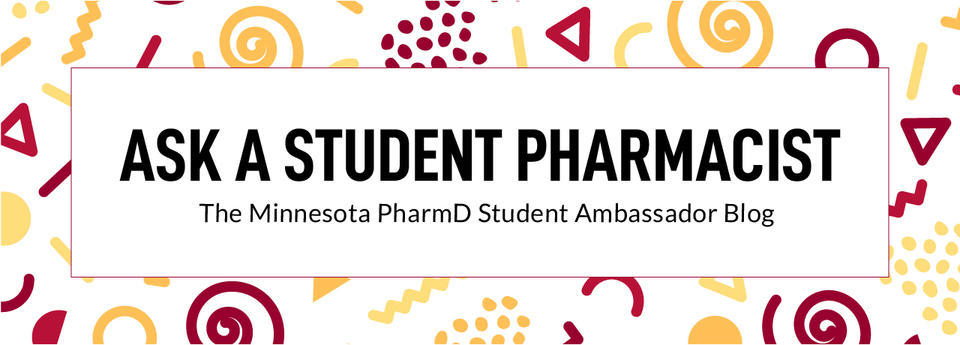
Welcome to our blog! University of Minnesota PharmD student ambassadors are sharing what it's like to be part of our program. To learn more about our program, join our email list or contact us directly with questions or to be connected with a student ambassador.
Submit your questions for our student ambassadors by emailing pharmacy@umn.edu.
- My first-year experience: the most challenging class
- What I wish I would have known before starting pharmacy school - Top 4 tips
- Four things I wish I’d known before I started pharmacy school (and actually paid attention to)
- My First Steps
- The One Where She Goes on IPPE Rotations
- Considerations from an out-of-state pharmacy student
- Food for future pharmacists
- What I wish I had known about pharmacy school
- Six tips for transitioning from undergrad to a professional program
- Relationship status
- Why I chose to work
- The HOPE Clinic
- To e-note or not to e-note
- Volunteering with the Phillips Neighborhood Clinic
- We are the Pharmily!
- How I take notes and stay organized
- Work, what is it good for?
- What I wish I'd known before starting pharmacy school
- It's never too late: my experience as a nontraditional student
- My favorite note-taking strategy: OneNote
- My first-year experience: as a community college graduate
The blog
My first-year experience: the most challenging class
Jessica K.
Class of 2023, Duluth campus, from Glencoe, MN
Coming into pharmacy school, I wasn’t exactly sure what to expect regarding the rigor of the classes and coursework. Honestly, I was the type of student in undergrad that did what I had to do in order to get through and didn’t put much thought into things past that point (terrible habit, by the way!). I quickly realized after the first few weeks of my first fall semester of pharmacy school that I needed to actually apply myself and learn from my mistakes in order to survive pharmacy school. The course that largely influenced this epiphany was Pharmaceutical Case Skills Lab – also known more simply as Lab.
I graduated undergrad with a degree in biochemistry, so I have had my fair share of laboratory courses. There weren’t any “right or wrong” answers and anything that didn’t go quite as planned could be analyzed and discussed in your formal write-up. I had been in this mindset for so long that, when I got to my lab course in pharmacy school, it took me a while to adjust to the fact that a “wrong” answer or outcome could not be rationalized by a thorough analysis but could instead result in harm to a patient. To be completely honest, this was quite terrifying for me, but it has ultimately helped me develop into the best aspiring pharmacist! Although this concept may come as a shock, it also sets the tone for the rest of the pharmacy curriculum because you are now constantly aware that patient’ safety is one of the top priorities and “good enough” and uncertainties should not be settled for. This applies to all three sections of the lab course – sterile compounding, non-sterile compounding, and patient education.
If you ask other pharmacy students at any point in their curriculum, you’ll hear another reason why the Lab course is so challenging and causes some mixed feelings is because of the grading structure. For each assignment/activity completed, the grade is determined by whether you did everything “perfect” and used best practice (S+), made minor errors/omissions that are not best practice but do not cause patient harm (S), or made errors/omissions that could lead to patient harm (S-). The class is pass/fail and this is determined by how many S- ratings you receive throughout the semester. This can be a source of stress for some students, but it is important to remember that there are resources such as the tutoring center, your teaching assistants, and open-lab times to get help with concepts and skills that you may be struggling with. These have been the most beneficial resources for me in alleviating some of the unnecessary stress I was carrying with me and helped me set a good foundation for building on my skills in subsequent years of pharmacy school.
In conclusion, I cannot say that Lab is the most important class for pharmacy students, but it does teach you the core concepts in the hands-on duties a pharmacist may have in a multitude of settings. It also aids you in restructuring your mindset from the “good enough/rationalize inconsistencies” thought process to that “right vs. wrong answer” mentality that many of us are not used to utilizing. You can master the guidelines and textbook information presented to you in the other core curriculum classes, but you will not thrive as a pharmacist if you do not have these basic patient care skills taught throughout the lab course. The Lab course may be challenging, but it is important to have confidence in yourself that you CAN do this and to utilize the resources provided if additional help or guidance is needed. I always tell students in the classes beneath me that “they really don’t want you to fail here” and if you put in the effort and the work and the dedication, you will succeed!
What I wish I would have known before starting pharmacy school - Top 4 tips
Elizabeth W.
Class of 2025, Twin Cities campus, from Farmington, MN
I’ve always considered myself a very Type-A person, but even so, I was extremely nervous to start pharmacy school. I was so adjusted to the competitive nature of undergrad, and I had fully convinced myself that pharmacy school would be way worse. Even though I completed my undergrad at the U of M—Twin Cities and started pharmacy school on the same campus, I knew no one. I remember being excited to start this new chapter of life, but I was also particularly nervous that I would not make a solid group of friends.
After having made it through several months of school—and now feeling more adjusted—I am actually so surprised at how wrong my perceptions were. Here are the 4 biggest takeaways that I wish I would have known before starting pharmacy school.
1.) Organization is KEY!
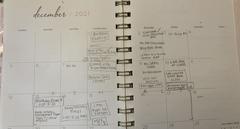
This sounds obvious…but even as a person who’s always been organized in general, a lot of my habits had to change to keep up with the demands of school. There are so many due dates for assignments, projects, exams, lectures, etc. to keep track of that it would be almost impossible to navigate school without having some kind of consistent system in place. Personally, I am a huge list person. I use a hard-copy calendar to keep track of big things (exams, projects, etc.), and then I use a weekly calendar to keep track of what is due every day each week for each class. Some people prefer Google calendars or use Canvas to manage due dates, so it doesn’t really matter what you use, as long as you utilize something and stay on top of it!!
2.) We’re on the same team!
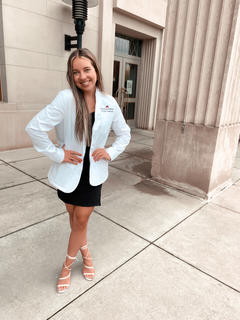
You’ve battled through Organic Chemistry, you took the PCAT, you’ve interviewed with multiple faculty members, and you scored a seat at a top 5 pharmacy school in the nation. And now the battle continues—but in a new way. Now that you’ve made it into pharmacy school, everyone in your class has the same goal—get a PharmD. My classmates and I really do help each other out—whether that’s studying together, clarifying assignment details, or just generally providing each other with helpful information—it is not an “every-man-for-himself” environment at all. Not even close! You want to graduate with the people you sat down with in class on the first day, and since you’re in the same classes as everyone your first year, making friends was truly no problem.
3.) Technology needs might differ
One of my biggest initial struggles with starting school was determining a good system to take notes. I was a paper/pencil notes person through college, and I truly felt committed to this note-taking method because I’ve always hated typing my notes. I had a laptop from undergrad that I brought with me to school, but I think the most helpful purchase I made in my first week of class was an iPad Air and the Notability app. This was a game-changer, and I wish I had it with me in undergrad. Notability essentially lets you handwrite/type/highlight/etc. notes on the iPad (giving you that paper/pencil feeling) without having to lug around 8 different notebooks. It’s definitely something I wish I would have known sooner!
4.) You can still maintain a social life.
I don’t know why I assumed that starting pharmacy school would kill all of my social plans and I’d experience a lot of FOMO, but I don’t think that’s been the case at all! I’ve been able to maintain being social, hanging out with my friends, trying new restaurants/coffee shops/breweries/etc. while managing school—I’ve just had to make sure I prioritize what’s important! On weeks where I have a few exams, sure, I’m less social and spend a lot more time studying, but on weeks where I don’t have any exams, I’ve found that taking breaks to do the things that make you happy/keep you energized genuinely helps school performance too! Burnout is real and taking necessary breaks for your mental health are just as important as studying for your next exam.
Four things I wish I’d known before I started pharmacy school (and actually paid attention to)
Patrick A.
Class of 2025, Twin Cities campus, from Eagan, MN
First off, I want to preface this by saying that prior to applying (and while attending) pharmacy school I had read many similar blog posts to this one right here, but I still had trouble taking it all to heart. It wasn’t until I began school in late August that I consciously realized, seemingly for the first time in my life, that when someone takes the time to give you advice, there is invariably value to it. Therefore, I guess the first thing I wish I’d known before I started pharmacy school… is to ACTUALLY pay attention to the advice of others.
2. Rely on your classmates and everyone is in a similar spot!
During the interview and application process I heard time and time again about the “pharmily”, an intangible concept that seemed to be everyone's favorite buzzword. It wasn’t until after the first few months of classes and group study sessions that I began to understand and watch the “pharmily” come into shape. Like most students, I thought that many of my classmates would already know each other, and I would be a bit on the “out” as I am an out of state student. In reality, nobody knows more than a small handful of other students, so the beginning of the semester is really a magical time to meet all of your peers. My classmates are my biggest asset to succeeding in courses. These are the people that are most accessible for assignment questions and are always willing to have study sessions before exams. So, help your peers and take advantage of their help!
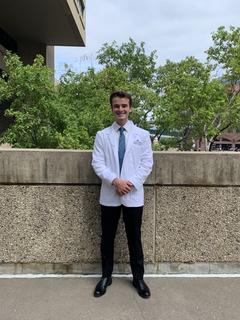
3. Network, network, network!
Yes really, it’s true. Networking can be absolutely huge for a future career as well as just socially as a human. I like to think of networking as an investment. A little bit of time (even five minutes), allocated once a week to talk with presenters after a seminar or connect on LinkedIn, can pay absolutely huge dividends later in a career. Not only has this helped to generate personal connections between myself and professionals, but it has also helped me learn about their careers and passions to help me figure out what I want to do. Starting this process early (as an undergrad or P1) can really help to build these valuable connections.
4. Keep up with prior relationships
This was one piece of advice I heard before I began pharmacy school that I took to heart but it truly is important. But seriously, make time for friends from undergrad or high school. If it's not possible to catch up in-person then Facetime them when you get a spare chance. While classes, extracurriculars, and work can be all-consuming and stressful at times of the semester, students are people too and need to take time for themselves. Scheduling some downtime for myself each day (and definitely on the weekends) is a strategy that has really helped me.
My First Steps
Alessandro A.
Class of 2025, Twin Cities campus, from Twin Cities metro area
Coming to pharmacy school here in the Twin Cities was a big change for me. I attended UW-Madison for my undergraduate years and so I was entering the program with no previous experience on campus. I considered it as an opportunity for a fresh start. Nervousness and excitement constantly tormented my mind as summer progressed and the semester approached. Not only was it my first day of a post-undergraduate program, but it was also the first time in over a year I would be attending in-person classes with my peers. I felt like I forgot how to interact with people after being cooped up on Zoom for so long. Doubts began to populate my head as well. I began to wonder if pharmacy school was right for me, if I was smart enough to complete the program, and if the career was even right. As I write this and look back, I doubted myself simply because I was afraid of new beginnings. I love where I am now, and I know I’ve made the right decision!
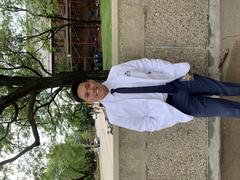
The way the program is set up allowed myself and my peers to ease into the program. We started out the first couple weeks with our introductory course Becoming a Pharmacist, or BaP as we all call it. It provided a soft landing for myself and all of my peers, introducing us to the program and allowing us to settle in. BaP is also where I took the opportunity to meet everyone in my class. BaP took place in a room where we all sat at small group tables for the sessions. The sessions lasted an hour and during the breaks I would visit a different table and chat. I was excited to be back in class with everyone and couldn’t help but talk to as many people as I possibly could each day.
As the semester progressed and the rest of the curriculum filtered in, I began to buckle down and was really enjoying being back in the physical classroom with all my peers around me. I am a social learner and found myself performing better when I was around my peers. The curriculum was also very different from my undergraduate curriculum. Back then I would be taking classes in all sorts of departments to fulfill the prerequisites, without really seeing a connection between them. In the pharmacy program, what I learn from one class could be applied and connected to the material of another. It invigorated me as a student to see all the connections and apply it to the larger picture.
At the beginning of the semester, I learned about all the different ways I could be involved through clubs and organizations. Each opportunity was unique and attractive in its own way, and I found myself wanting to join as many as I could. I knew that there was no way I would be able to balance 10 different organizations alongside homework. I ended up joining 4 and met many new people while enjoying many experiences through each of them. From weekly lunch lectures to volunteering events with St. Jude Children’s Hospital, each one brought an opportunity for growth.
“Should I work my first year?” is a common question that myself and my peers were asking at the beginning of the semester. There is no right or wrong answer and is based on whether or not you can fit it in your schedule. I decided to remain at my position as a pharmacy technician at a community pharmacy. I struggled at first to find the balance between school and work alongside my personal life. In the middle of the semester as class workloads began to increase, I began to question if I should remain at my job. However, I learned to balance all the different responsibilities and learned to better manage my time. To me, it is important to find time for myself as well. While balancing work and school, I always made time to enjoy myself. Whether it was going out with my friends in the program or simply staying in and watching Netflix, having a personal reset time made sure I was able to stay on my feet and recharge.
My one piece of advice would be to keep an open mind to the opportunities that will come along your way. There are so many different experiences available to you that you won't be able to try them all. During the fall IPPE I decided to try something new and volunteered to go up to Northern Minnesota for my placement. It was the kind of decision my pre-pharmacy self would not have made. I enjoyed every minute of it and learned a lot of things I don’t think I would have if I remained within my personal box. Just remember to not out-do yourself. There are so many ways to be involved and you’ll want to do them all. No matter which way you go about the program, each opportunity is a stepping stone for personal and professional growth. Keep an open mind and take it all in!
Overall, the first semester of pharmacy school was a large-scale learning experience, both in and outside of the classroom. I took and appreciated every opportunity that came my way. I met many new friends, faced the trials and tribulations, and found ways to grow out of each experience. I acknowledge my first semester as a stepping stone into the program and am excited to face the future semesters and the experiences that will come along with it!
The One Where She Goes on IPPE Rotations

Jessica K.
Class of 2023, Duluth campus, from Glencoe, MN
As a first and second-year pharmacy student, thinking about going on your Introductory Pharmacy Practice Experience (IPPE) rotations, whether that be the community or institutional one, is an extraordinary feeling. You find yourself excited to spend some time with a real-life practicing pharmacist and to do cool intern/student tasks that you may have been excluded from in the past as a pharmacy technician. For me, I was excited to have these experiences but I was also terrified. I would often ask myself, “How will I learn anything? I have no idea how to do any of that” or “Am I really ready for this?” The answer to that last question is ABSOLUTELY!!
The greatest thing about this pharmacy program is that it is rigorous academically, but you also have the advantage of having amazing faculty that help you mentally prepare to thrive in the classroom as well as in your experiential activities. Instead of being nervous, I was comfortable with the knowledge I had and was able to apply that knowledge to actual practice. When I completed my community IPPE rotation, I had already been prepared with patient assessment and counseling skills in the curriculum that I was able to practice on my rotation. It is such a rewarding feeling when you get there and think to yourself, “Hey, I can do that now!”
Similarly, I recently had a wonderful experience on my institutional IPPE rotation. I got to spend several days beside a pharmacist performing daily monitoring of patients, observe management and preparation of chemotherapy, observe a few surgical procedures and learn about anesthesia (super cool!), and observe a stress test/echocardiogram (imaging of the heart while a patient performs moderate exercise). As I mentioned in the beginning, these experiential activities have brought me a great amount of anxiety in the past. However, when it got to the time to complete these, I was ready to dive in! At this point in the curriculum, you have covered so much material and, if you are anything like me, feel like you still know nothing! The institutional IPPE is a great reinforcer of the wave of clinical information you have just learned in class.
What is the best thing about IPPEs, you ask? I no longer have anxiety/self-doubt about what I do/do not know! I can confidently say that I am EXCITED for my APPE (Advanced Pharmacy Practice Experience) rotations to start next Spring and I have my IPPE experiences and faculty to thank for that. The moral of the story is: if you aren’t already confident in yourself and your ability to become a good healthcare professional, the faculty here in this program and your IPPE rotations will prove you otherwise.
Considerations from an out-of-state pharmacy student
Leyla R.
Class of 2022, Twin Cities campus, from Bloomington, IN
When I first considered going to pharmacy school, being from Bloomington, IN, I thought the logical next step would be attending Purdue University. I would pay in-state tuition, I'd be close to family, and I wouldn't have to adjust to living just 2 hours away from where I grew up. Upon visiting other pharmacy schools, I decided to broaden my horizons and consider going to school out of state.
I applied to the University of Minnesota with the thought that I would only attend if I received the in-state tuition scholarship offered to 1 student in each class. However, after touring the campus and learning about all the additional opportunities that are afford to students who attend the U of M, I decided to go all-in on Minnesota. After being accepted, but not receiving the in-state tuition scholarship, I was tasked with the decision of attending school in-state, or going to the University of Minnesota, and paying out-of-state tuition.
I reached out to counselors at my alma mater, Indiana University, and seriously considered if it was worth moving to Minnesota 1 year early, and then reapplying to qualify for in-state tuition, or joining the class of 2022 as planned. My counselor put the cost of attendance in perspective for me, as she explained that if I put off graduating by 1 year, I would lose out on a year's worth of a pharmacist's salary, which is still in the 6-figure range. Additionally, if I moved to Minnesota a year before attending school, I worried that I would struggle to adjust without having my classmates help acclimate me to the area. Because Minnesota was ranked higher, boasted higher NAPLEX pass rates, and I wanted to go outside my comfort zone, I joined the class of 2022.
While being an out-of-state student has its flaws, I've managed fairly well adjusting to the Twin Cities, and still making time to go home. A large selling point of attending the Twin Cities campus is the proximity to the airport, where I can fly home in about an hour back to Indianapolis. Taking the light rail to and from the airport has been very convenient as I don't use Uber. I've been lucky enough to go home for winter breaks, spring breaks, and then once or twice over the summer.
I've found that attending school out of state has been a great way to spread my wings and become more independent. While I have a larger amount of debt than my in-state counterparts, I believe it is worth the financial strain to improve my education and skills as a future pharmacist, and afford me better opportunities after graduation. I've created a home away from home that will follow me wherever I end up!
Food for future pharmacists
Nicole W.
Class of 2024, Twin Cities campus, from Naperville, IL
Having completed my undergraduate degree in a small town in Iowa, moving to the Twin Cities opened up a ton of doors for me to try new foods. Bibimbap, baklava, fried chicken, kitfo; you can find almost any type of cuisine in the Twin Cities metro area! What's even better is that there's a wide range of options within walking distance of Weaver-Densford Hall. Here are some of my favorites that I've walked to from my apartment in Stadium Village.
- Kimchi Tofu House – Here they have a great lunch/dinner special, you can get silken tofu stew and one of their grilled options for only $15. I recommend trying the bulgogi and bibimbap!
- Al's Breakfast – This restaurant is a right of passage if you're going to the Twin Cities campus. The meals are giant and the prices are decent.
- Afro Deli & Grill – This restaurant was my first introduction to African food, and has made me excited to try more. I've loved the afro steak dinner and sambusa.
- Wally's Falafel and Hummus – If you have a big appetite, then Wally's is for you. They also have quite a few vegetarian options. My favorites are the beef shawarma and kofta kabob plate.
- Insomnia Cookies – When it's midnight and you're craving sugar, this is where you go. They have tons of cookie options and you can make them into an ice cream sandwich if that's what you're craving.
- Chatime - I'm a big fan of bubble tea and while there's a ton of bubble tea shops near campus, chatime is my favorite. They have tons of interesting flavors and the taro milk tea is my favorite.
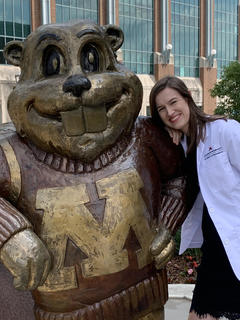
While those are just some of my most frequented restaurants in the Dinkytown and Stadium Village areas, there area ton more in the area worth trying!
If you have access to a car (or a food delivery app), there are even more restaurants at your disposal. Sometimes the amount of restaurants can even feel overwhelming, as there's just so many options to choose from. Here are some that I've driven to and really enjoyed:
- Pizza Luce – A little bit on the expensive side, Pizza Luce serves up delicious thin-crust pizza that I cannot put down. You can order one of their specialty pizzas or build your own.
- Portillo's – Okay, I'm probably biased as I grew up in the Chicago suburbs, but Portillo's is the best place for comfort food. A Chicago dog and a chocolate cake shake can never go wrong.
- Ramen Kazama Select – Just north of campus, Ramen Kazama offers multiple different styles of ramen and a few rice dishes. I always get the tonkatsu ramen with an extra egg.
- Baldamar – Is your wealthy uncle in town? This is where you have him take you to dinner. It's a steakhouse that also have some seafood and white meat options.
- Nelson's Ice Cream – Get a child's sized ice cream. Trust me.
- Hawaii Poke Bowl – If you love sushi but want to try something new, poke bowls are the way to go. Hawaii Poke bowl offers a build a bowl option, but I normally go with their rainbow bowl.
You really can't go wrong with food in the Twin Cities metro area, as there's always something new to try. If you run out of options, you can always ask older students and even the professors for recommendations; they can always think up of places you've never thought of trying!
What I wish I had known about pharmacy school
Anish P.
Class of 2024, Duluth campus, from Nagpur, India
A lot of times, in the middle of a lecture or the night before a deadline, I pause to reflect on how much I've learned since starting pharmacy school. Not a single day goes by without feeling thankful for where I am and how lucky I am to be here. Like other students, I worked hard and clambered my way through the competition to be offered the chance to attend pharmacy school at the University of Minnesota.
Some of you might step into pharmacy school expecting another four years of grinding through university, fending for yourself, and graduating with the doctorate you pursued for so many years. I was no different; I came here on my first day with my jaws clenched, plans set, and tongue bitten. Years of competing had conditioned me into trusting nobody, and effectively becoming an academic hermit. "There's no one here looking out for you," I thought, and the only way out is by adapting rigidly heuristic and gritty studying strategies.
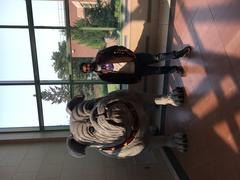
I could not have been more wrong. I don't know how different my experience here would have been if I were right, and frankly, I don't wish to know. These days I can't imagine going a day without the support of the "pharmily." I thought it was a corny idea the first time I heard it, but the more I get to know my peers, the more our camaraderie turns into an almost intangible bond. The support in our pharmacy community is accurately described as a family, and it's a privilege to be a part of one.
My study group and classmates have been instrumental in helping me get through the barrage of exams and assignments every week; I certainly owe my success here to their support. There is someone to support you every step through pharmacy school. It took me a solid few months to wrap my head around using tutoring hours and TA help for things I was having difficulties with. Your most daunting problems turn into non-issues the moment people step in to help. It is okay to ask for help, and we are all sailing in the same boat. I guess that has to be one of the biggest shifts in mindset I have experienced in my time here, and the most important thing I could have known before entering the program. We aren't here to compete with each other, we're here to help and support each other throughout our journey in pharmacy school.
Another thing I noticed when I started pharmacy school was how prevalent iPads are in the classroom. While a laptop is the basic standard for getting work done, I was surprised to see how many students supplemented their learning with an iPad. In the switch to online learning, many students watch lectures on their laptops and take notes with their iPads and Apple pencils. I, on the other hand, am a hands-on, pen-on-paper person. I find myself considering getting an iPad too, but I'm not convinced it is (at least) $500 better than my current pen and paper setup. I think it's a good idea to not get caught up in spending a lot of money on the latest tech gear, as I don't see an iPad as a necessity. Take your time and find out what works best for you.
To the prospective UMN PharmD's reading this, this is what I hope you will keep in mind when you start here: Congratulations, you're here and you've made it! Relax and take it easy. Make some great friends (which I believe you will have no trouble doing) and get comfortable; it's nice here!
Six tips for transitioning from undergrad to a professional program
Erin H.
Class of 2022, Duluth campus, from Aitkin, MN
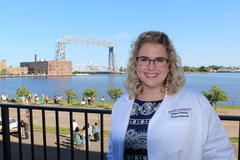
When I went through high school, I thought it was the hardest thing I had ever had to do. Then I went to college, which made high school look like a breeze... and then I went to pharmacy school. Each transition felt like a complete reset to my life with its own unique challenges. Now that I have had time to reflect on these transitions in my third year of pharmacy school, I would like to pass on advice that has gotten me through even the toughest of times.
#1: Be Intentional with Your Time
This consistent piece of advice will save you stress and improve your overall happiness if you can stick to it. As a pharmacy student, you will have so many areas in your life demanding your time: studying, going to class, spending time with your family/children/significant other, maintaining relationships with friends, work, student organizations... the list goes on. Spend some time considering your priorities among this list; it is normal for that time to flux depending on the day or week, but make sure you are dedicating some time to all your priorities. If it is not a priority, scratch it from the list.
#2: Form Study Groups
While I do not rely on study groups as much in my third year as I did in my first year, the study groups I formed first year proved to be essential to my transition to pharmacy school. It is hard to not invite all your new pharmacy friends to your study group, but try to keep a study group to 3 or 4 people to help maintain productivity. You and your classmates are all coming into pharmacy school with different educational backgrounds; these study groups help assess where your gaps in knowledge are as you work through class content. My study groups would make study guides together before each exam and check our answers on assignments where group collaboration was permitted. Try to set a group goal for your study time to hold your peers accountable.
#3: Get Involved
Having good grades is the expectation leaving pharmacy school, so jobs and residencies are going to look for what you did with your time outside of class. But how do you choose? I will tie this in with my advice from #1: be intentional with your time. Make a list of 3 to 4 things that you are passionate about and find organizations (could be inside or outside pharmacy school!) that will help you pursue those passions. If you find that this is hard to do in your first year, it is totally okay to cast your net wide early on and narrow it down as you get familiar with the student organizations. Do not join organizations just to put on your CV because you think that is what residencies or jobs are looking for; future employers will be looking for commitment and your ability to speak to your experiences. When you are passionate about their purpose, that will naturally come through in your future interviews.
#4: Feeling Occasionally Overwhelmed is Normal
I think this isn't talked about enough, and I want you to know you are not alone. Finessing your time to balance all your demands is hard work, and I do not know a single person who does it perfectly. It is also a sign that you are pushing yourself beyond your boundaries which will help you grow as a person. However, be mindful of these feelings. If you find that you are spending more time overwhelmed than tackling the tasks at hand, assess what changes you need to make. Sometimes that is reaching out to outside help, whether that is a school counselor or a friend/family member you trust. Asking for help is okay and encouraged.
#5: Remember Your Why
Whenever I am feeling overwhelmed, I always go back to my "why." Why do you want to be a pharmacist? Write this down and post it somewhere that's easily visible (desk, backpack, planner, etc.). I use my "why" as a motivator through tough times because I am cognizant that this is yet another phase in my life toward reaching my career goal of becoming a pharmacist.
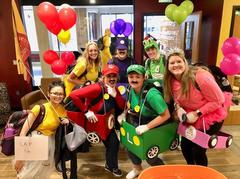
#6: Have Fun!
I promise this is my last plug to get involved with the College of Pharmacy, but there are so many opportunities that provide stress relief. My favorite stress-reliever put on by the College is our annual Bonspiel, a weekend-long curling event filled with competition, music, and costumes that is attended by students and faculty alike. In fact, my class's passion for costumes extends beyond Bonspiel and we enjoy dressing up for class on Halloween as well. I've included a photo of our 2019 Mario Kart Crew; we thoroughly enjoyed the smiles and Snapchat features we received from the undergraduate students as we played the theme song on our way to the library. These experiences are invaluable to my time at the College of Pharmacy.
Relationship status
Jessica K.
Class of 2023, Duluth campus, from Glencoe, MN
In order to understand my experience maintaining a romantic relationship in pharmacy school, you'll need to know a little bit about me. My name is Jessica, and I am a second-year pharmacy student on the Duluth campus. Between you and me, the Duluth campus was not my preference (but it turned out to be the best decision, FYI!! So trust the process!!).
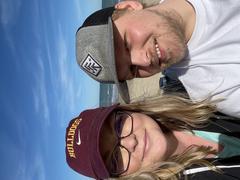
My reasoning for this is because attending the Duluth campus required me to move 3.5 hours away from my fiancé. Throughout my undergraduate career, I only lived on-campus for about a year and a half, after which I commuted about an hour from home. Home is in Glencoe, MN where my fiancé and I live together with family. So, I was well-accustomed to living with my significant other when I moved away for pharmacy school.
During the first few months of classes, there were definitely challenges with balancing my time between school, work, extracurricular opportunities, and my fiancé. The distance was tough, and I felt like I was failing my partner by not holding up my end of the relationship. I quickly realized something needed to change.
Here are a few tips and tricks that I've come to live by in order to keep my busy school life plus my personal relationship in check:
- Don't be afraid to let your partner know you just need some time - No, not like those cheesy "break-up" scenes in the movies. I mean, if you need some uninterrupted time to complete an assignment, just tell them. If you have a test to study for, let them know. I spent too much time worrying about balancing my time on my own which took a negative toll on my mental health. Save yourself some unneeded stress and communicate your school needs openly with your partner!
- Outline your semester early - As I mentioned, attending the Duluth campus put me into a long-distance relationship situation. I found it very helpful to plan out my semester in a planner, indicating the days/weekends I would go home. Doing this reduced the amount of "surprises," such as being scheduled to work and also put my fiancé at ease knowing I had plans to actually come back (haha ?). This system also helped me to arrange my course workload to ensure I could have some quality time with my fiancé when I was home. By no means do you need to schedule every day, hour to hour, but taking time in the beginning of the semester to outline what it may look like will benefit you.
- Know when to take a break - Attending a graduate or professional program is rigorous and demanding. However, your mental health and relationship health are important, too. It is okay to set school aside for a few hours or even a day and simply spend time with your partner. Do something fun, go on a date, or watch some Netflix!
These are definitely not the only 3 things than can help you maintain a relationship during pharmacy school, but they certainly helped me have a more balanced and healthier experience. Like it or not, you are going to have to work harder and in different ways than your other classmates who have differing relationship statuses, but it is so worth it. There is something about working towards a future for yourself AND your partner, and it is a journey best done as a team together!
Best, Jessica
Why I chose to work
Megan T.
Class of 2022, Duluth campus, from Le Center, MN
To work or not to work during pharmacy school is a question that pops up more often than you'd think! I want to tell you why I choose to work while in pharmacy school. There are a couple different reasons, so let's go through them.
- Let's talk about the most obvious: money. We all have expenses: rent, groceries, activity fees, and spending money. Loans go a long way of course, but it is always nice to have that little extra chunk of change.
- Working gives me a couple of things: experience and intern hours. I work multiple jobs but one of them is as a pharmacy intern. I get the experience of applying what I learn in class to real patients. The MN Board of Pharmacy also requires pharmacy students to have 280 intern hours outside of rotations and I work both in the summer and during the school year, so my hours are done!
- Change in scenery and stress: I find that working while in school helps with the balance. If it is all schoolwork, all the time, burnout is a real thing. When I go to work, I get to take a break from the stress of studying, projects, and due dates. I get to focus on work and only work while my mind gets to switch gears and take a break. We get all kinds of reminders from the College to take breaks and practice well-being and stress relief; this is mine. I thrive on social interaction and being able to talk to patients, students, and professors while working is like recharging my batteries. While I love interaction, I know that I also need my space. My pharmacy job gives me socialization while my lab assistant job gives me solitude and a routine. Both are needed, so the balance is pretty great.
My Journey: Before my 1st year of school, I already had a job as a pharmacy technician, and I debated for a long time about whether or not I should continue working during school. I ultimately decided it would be a smart move to keep that job and transition to being an intern after my first year. I worked 10-15 hours a week and found it manageable, but I did cut back on my hours during the weeks leading up to finals, because, hey, school is still important!
My 2nd year, I increased my workload because I had the flexibility to do so. I kept my internship while also taking on a lab assistant position and a teaching assistant (TA) position. I have a lot of freedom to make my own schedule which is why I took on more than one job. I get a lot of different experiences with each job and each is fulfilling in its own way. The lab assistant position gives me insight into pharmaceutical ordering, organization, and communication with professors and students. The TA position gives me the opportunity to help my peers excel in the program and gives me a chance to get to know more people. Working in a pharmacy, I get practical experience and it is nice to be able to take all that I learn in school and apply it in real life. For me, that solidifies why I chose this profession.
Good luck! Megan
The HOPE Clinic
Jacob N.
Class of 2023, Duluth campus, from Plymouth, MN
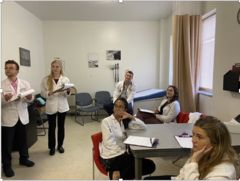
My name is Jake Noble, and I am a currently a PD2 on the Duluth campus. In pharmacy school, I have had the opportunity to volunteer at and serve on the executive board of the HOPE clinic. On the Duluth campus, the HOPE clinic is a non-profit, student-run, free-clinic where medical and pharmacy students are able to volunteer at the CHUM center to provide medical care to the surrounding low-income and homeless community. The HOPE Clinic occurs every Thursday from 3-5 pm and we meet with patients on a walk-in basis to discuss their ailments with us. Common tests that we are able to provide for the patients we see include blood pressure, glucose monitoring and pregnancy tests.
Students are able to volunteer at clinic in a variety of roles such as student pharmacist, patient intake and patient advocate. When a patient is seeking care and comes into clinic, the first individual they encounter is the patient intake. While with this individual, the patient has their vitals taken and undergoes a drug review. Once it is determined the patient is stable, they are transferred to an exam room where they meet with the patient advocate and student pharmacist. Through this process, student volunteers get hands-on experience talking with patients and documenting pertinent information related to lab values and medications.
One thing I have personally enjoyed while volunteering at HOPE clinic is our ability to help those who are less fortunate within the Duluth community; additionally, this experience has helped develop my leadership skills within my pharmacy journey. I think that this clinic holds a lot of opportunities for students who are wanting to volunteer while in pharmacy school and allows us to practice our clinical skills outside of the pharmacy curriculum and/or work experience.
For individuals who are applying to pharmacy school and are looking for something that sets the University of Minnesota apart from the others, HOPE clinic engages with students meaningfully to allow them to provide care to underserved communities, while having a manageable work schedule. Recently, the executive board was able to refurbish the clinic space by repainting the walls and putting in a new floor for the clinic. These improvements allow for a safe, welcoming space that is both functional and accessible. I'm thankful for my time at the HOPE Clinic and look forward to continuing this important work.
To e-note or not to e-note
Ciara W.
Class of 2023, Duluth campus, from Plymouth, MN
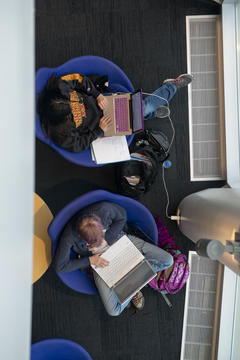
When entering pharmacy school, there is a lot of discussion on the best way to take notes. I had always been a pen and paper note-taker and assumed that I would continue this method in pharmacy school. However, after talking with many upperclassmen and going through the Becoming a Pharmacist course, I decided that I was going to invest in an iPad for taking electronic notes. This investment has been very helpful in improving the efficiency and quality of my notes and I am so glad that I did it!
The Tools I Use: I use an iPad with an Apple Pencil and an app called 'Notability' for my electronic note-taking. I have other Apple products, so I liked the ability of the iPad to connect with my other devices. The Notability app has many tools for organization and a variety of pen and text styles so you can customize your notes to best fit your style. The app allows for the creation of folders for individual classes and dividers that allow the folders to be further organized (I organize mine by semester). There is a wide range of pen and highlighter colors and styles available, too. This has been useful for making study guides and organizing my notes by writing with different colors. There is also a typing setting on the app so you can use the keyboard to type notes as well.
Benefits of electronic note-taking:
- Convenience – all my notes are in one place so I don't have to worry about having the correct notebook for class. Additionally, Notability automatically backs up all of my notes to my Google drive so I can access them anywhere. It is also very easy to download PowerPoints from Canvas to Notability for class.
- Efficiency – I have found that my note-taking skills have improved and I have been able to listen more in class. When I have the slides downloaded to Notability, I don't have to worry about copying that information down, and I can focus on listening to what the professor is saying about the topic. Notability also has a copy and paste feature which is handy if you are drawing a lot of structures – you can copy and paste rather than redrawing a structure or diagram.
- Organization – I never have trouble finding any of my notes when I am looking for something from a previous class. The folder organization allows me to have all of my notes from my previous classes at my fingertips. There is also a search feature that detects words in typed and handwritten notes to aid in finding what you're looking for!
Looking back now, I am so glad that I made the investment and switch to electronic note-taking as I transitioned to pharmacy school. Making the switch to electronic note-taking does take some time to get used to, but for me, it was definitely worth the transition. At the end of the day, every student learns a little bit differently. It's really up to you to find the method that works best for you and your learning style!
Volunteering with the Phillips Neighborhood Clinic
Kally K.
Class of 2023, Twin Cities campus, from Fargo, ND
In deciding where I was going to attend pharmacy school, I was really focused on not only the caliber of academics, but also what each school offered in terms of opportunities outside of school. Part of the reason I chose the University of Minnesota was the opportunity to participate in the Phillips Neighborhood Clinic.
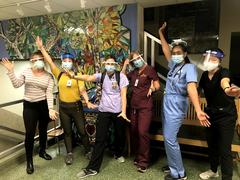
The Phillips Neighborhood Clinic (PNC) is an entirely student-run, free clinic that caters to underserved patient populations in the Twin Cities area. The clinic operates out of a church in the Phillips neighborhood in South Minneapolis. As a pharmacy student, I get to work with many students from different health professions including medicine, nursing, public health, nutrition, and physical therapy, among others. PNC is open on Monday and Thursday evenings and is run on a first-come, first-served basis and we see a set number of patients at each clinic night; PNC typically sees an average of 8-13 patients a night.
Services that PNC offers include primary healthcare, basic laboratory testing, STI testing, physical therapy, and specialty nights that cater to women's health, dentistry, ophthalmology, pediatrics, and dentistry. Additionally, there is a pharmacy within the clinic where patients may choose to fill prescriptions they receive during their visit. There are health professionals from the community including doctors, pharmacists, and physical therapists that volunteer as preceptors in the clinic and oversee all operations within the clinic. All services and prescriptions in the clinic are free of charge to the patient.
As a pharmacy student, you can apply to be a regular volunteer at the Phillip's Neighborhood Clinic during your first year. Volunteer roles for PD1 students include:
- Reception: Check-in patients as they come in
- Clerk: Organize the list of patients for the night
- Lab: Draw blood samples and run other diagnostic testing
- Patient Care Lead
Each role offers a unique set of challenges and learning opportunities. For most health professional students, the first-year role provides new experiences that may not be covered in other internships, or shadowing opportunities during their professional career. It is for this reason that I found my first-year role within PNC so rewarding and enriching.
During my first year, I volunteered in reception, where I learned how to initiate a patient's appointment within the clinic, deal with conflict management, gather chief complaints from a patient, and really learn how to ask patients the right questions to ensure their needs are met during their time at the clinic. As a receptionist, I serve as the first point of contact for patients and it is my job to determine how best to direct patients throughout the clinic encounter and update patients on wait times.
Through my experiences at PNC, I've been afforded many learning opportunities and a sense of fulfillment. Additionally, the challenges that I have encountered while volunteering at PNC have helped me to develop conflict management skills, interprofessional communication skills, and patient-care skills.
PNC provides an amazing opportunity for health professional students to be part of closing the gap of health disparities for members of the Twin Cities communities. The clinic brings together student professionals from all different backgrounds to provide patient care to community members who often do not have access to affordable health care. My participation in PNC has been one of the most inspiring and rewarding experiences of my pharmacy school career and I would highly recommend becoming involved in PNC in any capacity.
What is the Pharmily?
Kaitlyn H.
Class of 2023, Duluth campus, from White Bear Lake, MN
We are the Pharmily!
The Pharmily is a cute little name we gave to the community within the College of Pharmacy since we become like a second family to each other by the end of the program. When you start off your journey as a brand new pharmacy student it can be difficult to imagine how unbelievably close you will get to your classmates. As you move through the curriculum, you start to form your own network of people that you depend on when things get difficult and people you celebrate successes with. These people support you as you support others within the Pharmily to help each other succeed.
We all care about each other and about our future patients so we all help each other grow and learn in whatever way we can. We know how stressful pharmacy school can be, so we also de-stress together outside of classes. Whether the celebration is a party, an organized event, or a school event we know we can count on our classmates to be excited in our accomplishments. In general we are all taking the same classes so if you need help there are tons of people to ask! We get used to being both the ones asking questions and the ones answering questions for other students in our program. We are all in this together so we all support each other like family.
Pharmily for me means being comfortable enough to reach out for help or to celebrate success with someone who knows just how hard you worked to get there. Throughout the years of pharmacy school you will have many exams and jam-packed weeks, but through it all you have your Pharmily helping you and supporting you all along the way. As you traverse the curriculum together you learn more about each other and get more intertwined in each other's lives. They are the people who push you to become better and encourage you to work harder to learn as much as you can while you're here. They are the ones who you stay up studying with you in the commons for the big test the night before; they are the ones that celebrate good scores with you; and they are the ones that encourage you to take a night off. All along your journey through pharmacy school the Pharmily is there to help you make it to the end.
We are a second family through and through.
How I take notes and stay organized
Krista O.
Class of 2023, Twin Cities campus, from Blaine, MN
If you don't already have a device that you can take electronic hand-written notes on, I would highly recommend investing in one, whether it is an iPad that is compatible with the Apple pencil (my personal favorite), the Microsoft Surface, or another laptop that works with a stylus. Everything I say in this post will be based on the iPad, because that is what I use. Different devices may differ in functionality.

Once you've picked your device, you'll need a note-taking app. My favorite is OneNote; it is free to download in the App Store and all you need is an email address to make an account. Once you make an account it automatically saves everything you write, insert, or type. This is useful because it makes it really hard for you to have that gut-sinking moment of losing all of your notes because of a device crash after you forgot to hit "save." I also use GoodNotes, which is another app. You do have to pay to download it, but I like the templates it has and I use this app to create a digital planner and calendar spread. I also use GoodNotes as a blank page to rewrite important notes or make charts while split-screening with my original notes in OneNote.
Note-taking feels a million times easier. I'm a color-coder; I love writing equations in green, important things to remember in red, questions in purple, and so on. Having an iPad and using OneNote has been a lifesaver for me! No more toting around a huge bag of colored pens and highlighters - I can change my color with the click of a button. You can have multiple pen presets so that your most used colors are always available at the top of the screen and all you have to do is tap the color you want next. On a similar note, you can make stickers using bitmoji or other little symbols that can create landmarks in your notes. I can't tell you how many times I've inserted a confused bitmoji in my notes just to be silly, and then my friends and I used it later to find the content we need to pay extra attention to while studying for the test.
You can also insert PDF documents, which is helpful because most instructors put up slide decks for the notes. You don't have to spend the time or waste as much paper printing them off; you can just upload them into your note-taking app and annotate or highlight right over top of them. This is also great because everything stays super organized, and there are never pages to be ripped out of your notebook or binder, only to be lost in the bottom of your backpack forever.
The last thing that I love about electronic notes is that you can pull them up anywhere. If my iPad is ever dead or I don't have it with me, I can pull up my planner, calendar and notes on any computer. Also if you download the apps on your phone, you can pull them up on there, too! This has been convenient in situations where one of my classmates sends a text asking a question about a due date, or my boss has asked if I can pick up a shift. I can just easily pull up the planner I created on my iPad and view it on my phone, giving them an answer right away, rather than waiting until I get home and can pull out my schedule.
Although electronic note-taking is amazing, sometimes you cannot avoid physical paper copies. For physical sheets of paper, I recommend getting an accordion folder. I file all of my physical homework assignments, tests, quizzes, and labs in an organized manner in one of these so that they are readily available to be referred back to as needed.
No matter how you decide to take your notes, the biggest key is to just stay organized. Title everything, mark pages with Post-it Notes or paper clips, and don't throw everything for every class into one random notebook or folder. There is so much going on in pharmacy school; you do not need the added stress of being unable to find something when you need it.
Work, what is it good for?
Tianna P.
Class of 2023, Duluth campus, from Iron River, WI
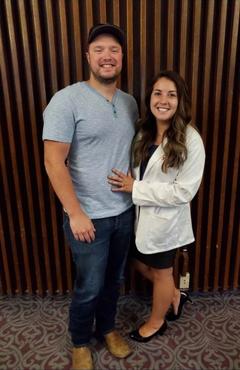
Badge... check, laptop... check, backpack... double check. Classes were about to start and I was getting all the last-minute details figured out. What was my daily routine going to look like? How stressed was I going to be? Was I ever going to sleep? All valid questions that I had to ask myself as I took a leap into the unknown.
For some background about me, I took four years off between undergrad and pharmacy school. I wasn't even sure if I remembered how to study for an exam, let alone pick my brain for information that I learned in all my prerequisite courses, some of which were nine years ago. Deciding to add in work on top of all of that was not an option, at least not for my first year of school. I needed the time to understand what it was like to be back in school; to see how often I thought that I had "extra time" during my schedule to even squeeze in work.
I took some time to think about how work could fit into my routine, if it was something that would benefit me personally. I decided that for my own personal growth and learning, I would take my first year off from working to get grounded with classes. I figured if I changed my mind about work, I could always add it at the last minute.
What I realized in my first-year trial:
- I am so glad that I decided to put all my time into school, I was able to relearn what it is like to be a student.
- There were days that I wanted to nap... and I napped without feeling bad about it.
- Relearning material is hard... really hard.
- I actually spent a majority of my first semester relearning the basics in order to grasp the new material. This was challenging for me, but knowing that I did not have the added stress of work and scheduling in that extra time, I was able to focus more on classes.
I realize that I made the right decision not working my first year. It gave me the extra freedom to do each of the things listed above. As silly as it sounds, I was able to find my inner student in a way that I may not have been able to if I had the added stress of work. I sit here now in my second year of school and I am working two jobs. Allowing myself to take my first year off helped me get ahead and learn how to learn. My first year set me up to be successful for the years to come.
What I wish I'd known before starting pharmacy school
Nicole W.
Class of 2024, Twin Cities Campus, from Naperville, IL

Coming into pharmacy school, I wasn't 100% sure what to expect. I had scoured pharmacy blogs for tips and tricks on how to balance my work/school/social life and asked pharmacists I worked with for their advice as well. However, no matter how much I prepared, I still felt like I wasn't ready for my first day of pharmacy school.
In undergrad, I had my studying technique down to a tee. For most classes, I would use my laptop to retype all the lecture content in Microsoft Word. Until starting pharmacy school, I didn't realize that doing this was a waste of time. I would never go back and look at these notes, so while I spent time writing up everything, I would miss out on what my professor was saying.
To give myself more time to process what was being said by my professor, I decided to invest in an iPad Air, based on recommendations from experienced pharmacy students. Using the app Notability, I am now able to take notes on top of PowerPoint slides so I can focus and write down anything important that the professors mention. I am also the type of person to go back and rewrite handwritten homework assignments if they didn't look orderly or easy to read, so the formatting tools on Notability have saved me a ton of time by allowing me to easily move around drawings or equations so my assignments look more organized.
A chemistry course here, an art course there, a sprinkle of English courses and you've got the recipe for an undergraduate degree. These disjointed classes always made undergrad interesting, as it felt like I had to be the jack-of-all-trades some semesters. I came into pharmacy school with the expectation that courses would feel like that, but maybe be a bit more pharmaceutical themed.
I did not expect the amount of overlap the courses would have. I've had professors skim over a topic and say, "Oh you don't need to know this in-depth right now, but you'll learn it in more detail during _____ course" or "You should learn this right now as you'll need to have it memorized while on rotations." Not only does this make all the courses feel cohesive, but it has helped me feel like what I am learning will be useful in future courses. If I don't master something right away, I'll still have the opportunity to build upon my knowledge later and prove to myself that I've got it down.
One of my biggest fears coming into pharmacy school was that it would be difficult to meet other pharmacy students, especially during the limitations imposed by COVID-19. Despite having all my classes online, I have found it easy to connect with my classmates through other means, whether it is attending organization Zoom meetings or chatting with others through a class-wide group chat, there are many different methods to talk with other first-year students as well as students in other years of the program. I also was lucky enough to land an internship through the University of Minnesota Medical Center. This has allowed me to interact with classmates in-person, as well as gain practical experience, with the benefit of being financially compensated.
So wherever you're at in your application process, just know this: Do not worry about starting pharmacy school! You may never feel prepared, but once you start classes, everything will come together and you will wonder why you were ever worried in the first place!
It's never too late: my experience as a nontraditional student
Ashley G.
Class of 2022, Duluth campus, from Duluth, MN
My name is Ashley Goble and I am a third year on the Duluth campus. I am a non-traditional student.
What exactly does that mean? Well, The National Center of Education Statistics defines non-traditional student as meeting 1 of 7 characteristics: delayed enrollment into postsecondary education, attends college part-time, works full-time, is financially independent for financial aid purposes, has dependents other than a spouse, is a single parent, or does not have a high school diploma. That is a wide variety of characteristics. One that is not mentioned is age - this is usually 25 or older. I fit into the older category, delayed enrollment, attended college part-time while working full-time, and is financially independent.
For the past 15 years I have worked at Essentia Health St. Mary's Medical center in the inpatient pharmacy. During my time there I have been able to do some pretty interesting things, meet a lot of people, and learn so much about pharmacy. I have watched people come and go through the pharmacy department, starting out as pharmacy technicians and then coming back to work as pharmacists. They all helped me and encouraged me to follow my dream of becoming a pharmacist.
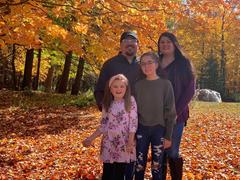
To tell you a little bit about me, I am married to my amazing husband, Lucas, and I am a mother of two girls, Kylie (12) and Kendall (8) - no they are not named after the Kardashians. I was born in Phoenix, AZ and moved to Duluth when I was 5 years old. So, I've been in Duluth pretty much my whole life; I went to high school here, was a three-sport athlete, hunted, and fished.
I was in a program in high school called Upward Bound which was for students that met a financial requirement or one or both of their parents didn't attend college. I fell into the parents not attending college category. This program helped me realize where my career interests were (you can probably take a guess): pharmacy and forensic science. Duluth didn't offer a job shadow for forensic science, so pharmacy it was! That is how I got interested in pharmacy - my first summer internship at Falk's Newman pharmacy when I was 17 years old.
Now let's fast forward to Fall of 2018, my first year of pharmacy school. I felt like I was a duck out of water. I had not been in school for 3 years and already felt like I was behind. I was used to taking notes with pen and paper. In pharmacy school, you need to be able to type, and type quickly, to take notes.
Staying organized is super important. I had never kept a planner in my life, but it is essential for pharmacy students to write down dates for exams, quizzes, TBL's [team-based learning assignments], assignments, and meetings to keep everything straight. Now, I always have my planner with me, especially since I need to keep track of my life outside of school with doctor's and dentist appointments, concerts, or parent teacher conferences.
Biochemistry was a struggle for me my first semester of first year, it was not a requirement for prerequisites so, I did not take it. Looking back, I could have saved myself a lot of headaches and late night studying had I taken biochemistry before pharmacy school. I still struggle with this, and every now and again it rears its ugly head.
Something that is a very real thing that not a lot of people talk about, or gets mentioned when you first start out your journey of pharmacy school, is called Imposter Syndrome. You feel like a fraud and question every decision you have made to get to where you are. Am I smart enough? Am I really cut out to do this? I am a failure. All these thoughts run through your head; luckily enough, I found a group of students that were having some of those same feelings.
We have formed strong bonds and keep each other moving forward, especially when you are feeling down. We are somewhat of a club that our family and friends will never truly understand, as we put in the blood, sweat, and tears necessary to succeed in pharmacy school. There is light at the end of the tunnel; it isn't going to be easy, but you will get through it.
Like the title of this blog says, "It's never too late", no matter what stage of life you are in; if you have a dream, put hard work in, make sacrifices, and keep moving forward, anything is possible.
My favorite note-taking strategy: OneNote
Megan T.
Class of 2022, Duluth campus, from Le Center, MN
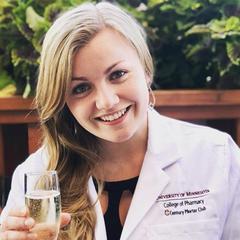
Everyone has their own way of learning and taking notes. With that being said, I'll tell you how I take notes and if this is something that works for you, great! If this doesn't work, then I hope you find a strategy that helps you learn.
My preference for note-taking is to use the application OneNote by Microsoft. OneNote is multifunctional and can be used on PC and Apple. Everything can be organized and is uploaded to the cloud in real time. I have a Pharmacy folder in OneNote that I separate into sections. Each section is labeled with the year and semester. Within these sections, I have individual tabs labeled with the class name for that semester. It is easy to navigate and has the option to color code, which is probably my favorite part! I color code my classes on my OneNote and then match the colors to my Google Calendar for class times and reminders of class-specific due dates. This might be going a little far on the neurotic organizers scale, but hey, it works for me.
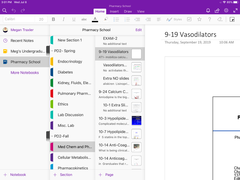
Each class (with the exception of ONE) I have ever had in Pharmacy School has used slides. It is the easiest way to relay a lot of information in a short period of time. Professors will post these slides online in either PowerPoint format or PDF. I download these into my OneNote under the specific class tab and put the date and topic in the title. Once my slides are in, I can type right next to the slides and use my mouse to highlight. I use the Ctrl + F function to find sections easily when I am looking for something specific.
My laptop is also a touch screen, so I can write on it; that feature helps when I want to quickly highlight something, draw arrows, or star a slide. Recently, my touch screen broke (yes very sad). So, I caved and bought a small iPad. The cool thing about OneNote is that it syncs across devices! If I download the slides on my laptop and type on it, it syncs to my iPad where I can write on the slides too. I find this type-and-write duo extremely helpful. Plus, I'm a doodler.
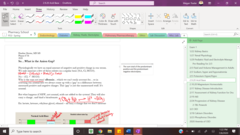
I cannot advocate enough for online note-taking. You may learn best by writing everything down by hand, but you need to take notes online. You can rewrite everything on paper later if that is what you need. Professors have a lot of slides and talk fast. Keeping up with them is hard enough typing, let alone writing by hand. There is only ONE class and ONE professor who asks that you hand write because his section is pretty much all structures (you draw a lot of chair structures). I hope this helps!
My first-year experience: as a community college graduate
Krista O.
Class of 2023, Twin Cities campus, from Blaine, MN
I started my college career at a local community college. At the time of my graduation from high school, I didn't know what I wanted to do. I wasn't ready to move away from home and I couldn't afford the tuition I would have to pay if I went to a university. Once I figured out that I wanted to pursue pharmacy, I found out I was able to stay at my community college to complete all of the prerequisites for pharmacy school. That is what I opted to do, rather than go get a Bachelor's degree first. When I first started the PharmD program at the University of Minnesota, I was embarrassed to admit to my classmates that I did not hold a Bachelor's degree. I felt like I wasn't as smart as them, or as worthy as them to have the same opportunity. Even though I was embarrassed, I wasn't going to lie; each time the question came up, I told my story. Many people ended up actually commending me for taking the route I did. "That's a smart decision, you probably saved a lot of money!" was the most popular comment I got. I realized that my classmates really didn't think less of me just because I came from a different background and a different path than them.
I will say, throughout my first year, I sometimes felt that I had to work harder than some of my classmates who majored and obtained a Bachelor's degree in different fields of science. They had taken more classes and learned a lot more than I had in certain subjects. I took two years and the bare minimum amount of prerequisites to get into the program, while they spent four years gaining expertise in their selected major. I was not at all familiar with some topics that many of my classmates had already extensively studied in the past. With that being said, it was still 100% manageable. I was still able to learn the material eventually, even if it took me more time than others.
My biggest piece of advice would be to try not to feel embarrassed if you come from an unconventional path because there are plenty of people in your class who are in the same boat. Whether that be those who came from a community college, people who took multiple years off from school, or people who completely switched their career path after working in finance for 10 years. In my first year, I found it helpful to connect with a variety of people; this way you have a large network around you and everyone can help each other. The reason this is so helpful is that each person can give a different perspective to each situation because each person has developed their own way of thinking. Not to mention people who came from a different path than you often have more or less knowledge in certain subjects, which means you have the opportunity to teach and learn from each other! Another thing that helps is to get involved. There are multiple clubs, organizations, and professional fraternities to get involved with. All of them give you the opportunity to meet new people and gain experience volunteering and doing community work, which is something I never did during my time at community college.
To conclude, it is important to understand that not everyone comes from the same path, but every path is valid. What seems easy to one person may be difficult for another, and that's okay. Uplift your classmates and remember to team up and learn from each other - it's hard to get through pharmacy school alone!